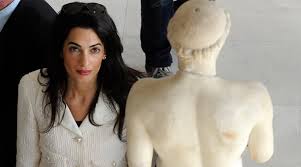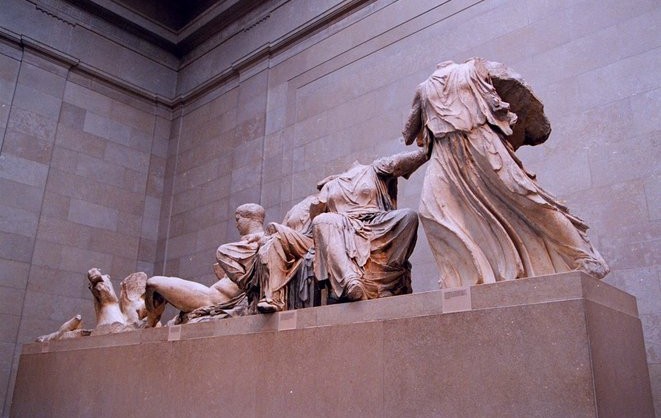The issue of Greece’s standing demand for the repatriation of the Parthenon Marbles from the British Museum has generated renewed interest by a portion of the UK press recently, with the Guardian, Telegraph and BBC all touching on the issue.
The Guardian judges that official Athens – currently expressed by the leftist SYRIZA government – has “quietly” abandoned the prospect of legally challenging for the return of the friezes.
“…Nikos Xydakis, the Greek culture minister, ruled out pursuing restitution through the international courts, despite the previous government’s hiring of a high-profile legal team from London’s Doughty Street Chambers – QCs including Geoffrey Robertson and Norman Palmer, and Amal Clooney,” the paper quoted the Greek culture minister as saying during a TV appearance.
“Low-key persistent work is what was needed … The road to reclaiming the return of the sculptures is diplomatic and political.”
The Telegraph, meanwhile, took a more Fleet Street view of the development.
“The Syriza government is keenly aware that British courts are recognized the world over for their experience in resolving international disputes, including those involving British interests and institutions. So, quite reasonably, the new Greek government has concluded that an international court will probably not reach a different conclusion,” it writes in interpreting Xydakis’ statement.
Of course, the Telegraph then “fudges up” history in a paragraph mostly aimed for readers it believes won’t turn to the Internet to check historical facts:
“… contrary to the widespread misconception — there was nothing illegal about the way in which Lord Elgin saved the Parthenon Sculptures from acute ongoing destruction. The mauling had started when the Greek church smashed up a large number of the ancient temple’s carvings in the fifth century. The Venetians then blew up chunks of the building in 1687. And in the 1800s, when Lord Elgin arrived in Athens, the occupying Ottomans were grinding the sculptures up for limestone and using them for artillery target practice.”
Of course, there was no “Greek church” in the 5th century AD, just one “official” church, which under the reign of Emperor Theodosius began to destroy pagan places of worship in what remained of the Roman empire. Most of the friezes atop the Parthenon escaped this fate (until Lord Elgin arrived_) while the temple itself was turned into a Christian chapel dedicated to the Virgin Mary.
The Venetians that the paper referred to had, indeed, put the Acropolis under siege, given that an Ottoman garrison was holed up there. Unfortunately, a mortar fired by the Venetians landed squarely atop the Parthenon, which the Ottomans used as an … armory and to store their gunpowder. The blast devastated the structure. Yet most of the friezes were still intact centuries later before Lord Elgin sliced them off.
Finally, if the Ottomans were “grinding the sculptures up” when Elgin arrived, why didn’t they grind up the remaining ones when Elgin left? No mention either of the “scrubbing” the marbles endured at the hands of BM curators in the 1930s — “conservation” that stripped off much of their patina.
Finally, the proverbially even-handed BBC wrote that in ruling out a legal challenge “…the country (Greece) has rejected the advice of barrister Amal Clooney, who had urged Greece to take Britain to the International Court of Justice.”

“Greece insists the Parthenon Sculptures – as they are properly known – were taken illegally and has pursued a high-profile campaign in recent years for their return, latterly with the help of Mrs Clooney,” BBC wrote.




































